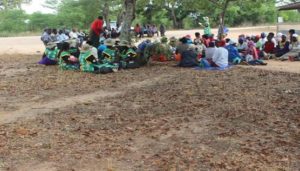Women remain at the centre of Heal Zimbabwe programming and have defied cultural norms and boundaries by taking a lead in building peaceful and prosperous communities. The United Nations Sustainable Development Goal (SDG) number 5 calls for Gender Equality. The objective of this goal is to end all forms of discrimination against all women and girls everywhere and eliminate all forms of violence against women and girls in the public and private spheres. It is in pursuit of this goal that Heal Zimbabwe prioritizes women in its programming.
Over the years, Heal Zimbabwe has worked with women from diverse political affiliations and social groupings in an effort to ensure that they participate as equal partners with men in democratic processes, peace building and conflict transformation within their communities. Due to patriarchal barriers, women and girls are usually excluded from decision making and participation in economic, social and political spheres. Political violence from past elections has also demoralized women to take leading roles in participating in democratic processes and building peace.
To bridge this gap, Heal Zimbabwe established 15 Women Safe Spaces for Reconciliation (WSSR), 4 Community Accountability Action Teams (CAATs) and 3 women led Community Based Organizations (CBOs), in 15 districts of Zimbabwe, areas susceptible to politically motivated violence. The 15 WSSR have been established in areas such as Muzarabani, Murehwa, Mutoko, Gutu, Buhera, Mazowe, Makoni, Mutasa, Tsholotsho, Mbire, Muzarabani, Zaka, Bikita and Gokwe South and Gokwe North. WSSR are groups of women from diverse political affiliations, cultural and religious backgrounds who work together to build tolerance and transform conflict within their communities. These women carry out various activities that include collaborative neutral platforms (nhimbes), community dialogues, mediation sessions, clean up campaigns, sports for peace, door to door meetings, public accountability platforms targeting diverse people in the community in an effort to build social cohesion, peace and tolerance.
In pursuit of the goal to empower women to become peace champions within their communities, Heal Zimbabwe trained the women in conflict mediation, stakeholder analysis and conflict mapping. The women leaders were capacitated with knowledge to conduct conflict analysis, mapping and mediation. The women meet fortnightly to discuss peace building and conflict transformation issues as well as other developmental and social issues affecting societal unity in their communities. When they meet, they do conflict mapping and analysis identifying root causes of conflict and key stakeholders involved. This informs the type of intervention to employ.
The WSSR have managed to engage several stakeholders within their communities holding duty bearers to account and mobilizing fellow women rights holders to participate in community processes that bring development and social change. A total of 702 duty bearers have been engaged who include Legislators, Senators, traditional leaders, local authorities, church leaders, health centers committees, Schools Development Committees, members of the police, Village Development Committees (VIDCOs) and Ward Development Committees (WADCOs). The WSSR also run small income generating projects that allows them to be economically empowered and also act as rallying points for the teams to meet regularly.
Besides WSSR, Heal Zimbabwe has also established 4 Community Accountability Action Teams (CAAT) in Masvingo province namely in Gutu, Zaka and Bikita Districts. The main objective of CAATs is to raise awareness on basic human rights using the human rights approach where they seek to empower local communities to know their rights and hold duty bearers to account. The CAATs have carried out several training of trainers meetings , door to door, clean up campaigns and community interface meetings. The trickling down of information on constitutional rights and obligations saw an increase in the number of young women participating in Council budgetary consultation meetings, SDC meetings, feedback meetings with Councillors, MPs and Senators. Interface accountability meetings which were held with duty bearers and attended by community members discussed among other things, the partisan distribution of food aid, abuse of Constituency development funds and social service delivery challenges. The CAATs managed to reach 3 000 community members and 201 Traditional leaders.
HZT also works with 3 women led Community Based Organizations (CBO). These are Kuyanana Garden of peace from Gokwe North, Kushinga Community Development Trust from Gutu and Kubatana Women’s trust from Mutoko. These CBOs were already existing organizations before being capacitated by Heal Zimbabwe to mainstream peace building in their day to day activities .The CBOs provide a platform for women to meet and discuss community issues affecting women. The CBOs have managed to mediate conflict cases within their communities varying from domestic violence cases, political disputes, unfair food distribution cases, land disputes etc. They have also managed to create platforms were conflicting parties meet and mend relations. These CBOs have been instrumental in mobilizing other women to participate in democratic processes through awareness raising and confidence building exercises. The CBO members also play the watch dog role by monitoring and reporting cases of human right abuses and violations to Heal Zimbabwe.
Heal Zimbabwe also created 67 community peace clubs in the target communities with half of the composition being women. The peace clubs are responsible for promoting peace and conflict transformation targeting everyone in the communities. Through these structures, women have taken a leading role in mediating conflicts and building peace in their communities. In line with this year’s Womens day theme, Women groups working with Heal Zimbabwe have demonstrated that they are bold for change within their communities in as far as building peaceful communities is concerned. To commemorate this important day, the women led groups have lined up several peace building initiatives in their communities which shall run concurrently on the 8th of March 2017.
The women led groups shall also be influential and at the forefront in mobilizing citizens to vote in peace under the Heal Zimbabwe National Peace Campaign to be launched next month.
Heal Zimbabwe envisions a peaceful and prosperous Zimbabwe that celebrates diversity in local communities. The organisation seeks to facilitate community healing, reconciliation, build peace and social justice through transforming conflicts in local communities.
Post published in: Featured


